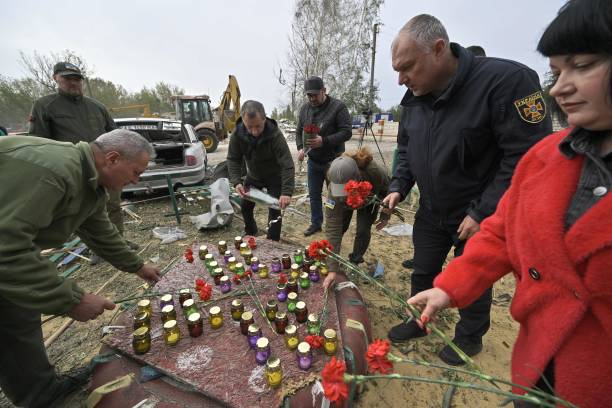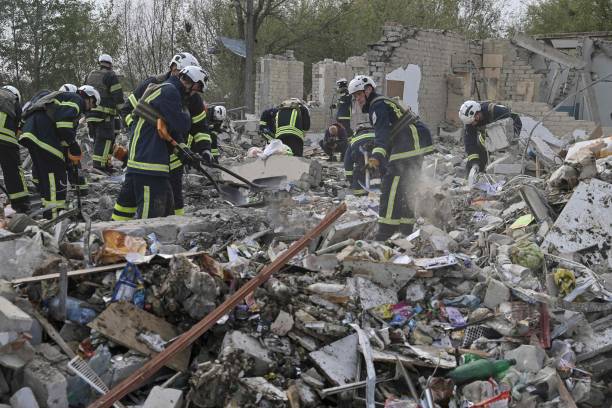Ukraine village reels after deadly missile strike: ‘Everything was burning’
A precision missile strike kills 52 in Hroza affecting ‘every household’
Your support helps us to tell the story
From reproductive rights to climate change to Big Tech, The Independent is on the ground when the story is developing. Whether it's investigating the financials of Elon Musk's pro-Trump PAC or producing our latest documentary, 'The A Word', which shines a light on the American women fighting for reproductive rights, we know how important it is to parse out the facts from the messaging.
At such a critical moment in US history, we need reporters on the ground. Your donation allows us to keep sending journalists to speak to both sides of the story.
The Independent is trusted by Americans across the entire political spectrum. And unlike many other quality news outlets, we choose not to lock Americans out of our reporting and analysis with paywalls. We believe quality journalism should be available to everyone, paid for by those who can afford it.
Your support makes all the difference.Every family in Ukraine’s northeastern village of Hroza was affected after a missile strike killed 52 people on Thursday, obliterating a sixth of the local population, say locals.
However, it may take several months before DNA analysis can identify the majority of the remains. For now, the names are scrawled on cardboard or white plastic squares, and strings mark the boundaries of the fresh graves.
Dozens of people gathered in the local cafe for a meal to honour Andrii Kozyr, a soldier who died in the war against Russia, with almost every household in the village sending someone to mourn the native son.
When the gathering was struck by a precision missile that Ukrainian officials said was fired by Russia, entire families perished in an instant. In all, 52 people died out of a population of 300, while only six people in the cafe survived, with villagers suspecting that a local may have tipped off Russian forces.
“From every household, there were people present,” said interior minister Ihor Klymenko.
“My neighbours, my neighbours,” Valentina Kozeinko, a 73-year-old retiree, wailed in agony. “A lot of our people died there,” she told CNN. “It was a powerful strike, very powerful, I came out and everything was burning,” she recalled. “It was so scary … The corpses were burned and there was blood everywhere.”
Among the dead was Valeriy Kozyr’s daughter, Olya, who was survived by her three children. Mr Kozyr’s son-in-law died in the attack as well.
"It would have been better if I had died," he said quietly as he wept. "Oh God, you cannot punish me like this. To leave the father and take the children!"
Wiping tears from his face, the 61-year-old explained that he must now work out how to care for his three grand-children aged 10, 15 and 17. Mr Kozyr wants to bury Olya and her husband side-by-side in a single grave.

Like much of the region east of the regional capital of Kharkiv, Hroza was under Russian occupation for six months, until September 2022, when Ukrainian troops liberated the area.
Locals say it is strictly a civilian area. There has never been any military base, whether Russian or Ukrainian. They said only civilians or family came to the funeral and wake, and residents were the only people who would have known where and when it was taking place.
Moscow denies targeting civilians in its full-scale invasion, a position it repeated on Friday in response to the Hroza strike. Thousands have been killed in a bombing campaign that has hit apartment blocks and restaurants as well as power stations, bridges and grain silos.
Ukrainian officials said the weapon was a precision Iskander-style missile, which is said to have an accuracy of five to seven meters.
Dmytro Chubenko, spokesperson for the regional prosecutor, said investigators are looking into whether someone from the area transmitted the cafe’s coordinates to the Russians — a betrayal to everyone now grieving in Hroza.

Many share that suspicion, describing a strike timed to kill the maximum number of people. The date of the funeral was set a few weeks ago, and the time was shared throughout the village late last week.
Not all of the victims have been identified. Regional police investigator Serhiy Bolvinov told reporters late on Thursday that authorities would have to use DNA to identify some of the victims because their remains were beyond recognition.
"Corpses lay there in that yard, and nobody could identify them," said Valentyna Kozienko, 73, speaking near her home close to the site.
"Half the village is gone, families are gone," said Kozyr, standing beside his wife as she wept. "All the time they miss. Well, this time, they hit.
"Now I’ll have to cross out half my phone book."
Additional reporting from the wires




Join our commenting forum
Join thought-provoking conversations, follow other Independent readers and see their replies
Comments